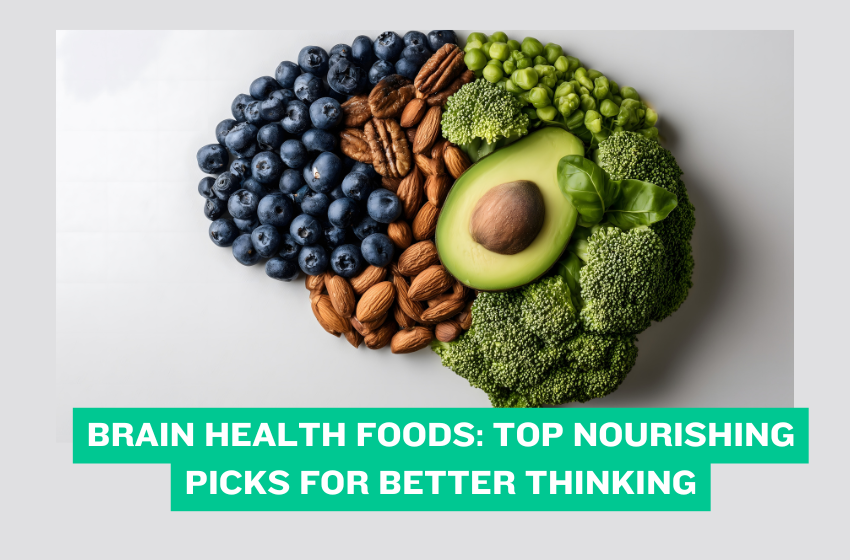
Brain health Foods: Top Nourishing Picks for Better Thinking
Feeling sharp, focused, and alert starts with what you eat. Brain health foods are essential for keeping your mind active and your thoughts clear. The right foods boost your focus, help your memory recover faster, and keep your energy levels balanced throughout the day.
Your brain needs proper nutrition just like your body does. When you choose smart meals rich in vitamins, antioxidants, and healthy fats, you strengthen your memory and support long-term brain health.
In this article, we’ll learn which foods are best for your brain, which ones to avoid, and how small dietary changes can make a big difference in your mental performance and overall well-being.
The Power of Brain Healthy Nutrition

When you eat smart, your brain thanks you. A balanced diet rich in vegetables, fish, legumes, and whole grains supports cognitive performance and long-term brain health.
Research shows healthy dietary patterns link to larger brain volume and stronger cognition. On the flip side, diets high in ultra-processed foods and saturated fats seem to raise risk of memory issues.
Read Also: What Are 5 Signs Your Brain Is in Trouble
When it comes to “brain food for memory” and “brain food for studying,” it’s clear that what you eat affects how well you remember, learn and process information. For example, one study found that leafy greens delayed cognitive aging by up to 11 years.
Best Foods for Brain Recovery and Memory
Recovery means your brain heals after stress, fatigue or heavy work. These foods help support that process, and also help memory and concentration.

Here are key picks for brain-boosting foods for students and anyone needing clarity:
- Fatty fish like salmon: Rich in omega-3s (DHA/EPA) that build brain cell membranes and boost memory.
- Berries, especially blueberries: Heavy in antioxidants and flavonoids that protect brain cells from damage
- Leafy greens and cruciferous vegetables: Full of vitamin K, lutein, folate — all beneficial for cognition.
- Eggs and nuts: Eggs provide choline (important for brain signalling) and nuts provide healthy fats and antioxidants.
If you are a student who seeks brain food for studying, mixing these into your meals helps. Focus on “brain food for memory and concentration” too, these nutrients support sustained attention and recall.
Worst Foods for Brain Health

Just as certain foods help your brain, others hurt it. Knowing what to avoid is as important as knowing what to eat. These items are often cited among the worst foods for brain health and what are the 5 worst foods for memory.
- Sugary drinks and high sugar snacks: Linked to higher risk of dementia and memory decline.
- Refined carbohydrates (white bread, white rice, pastries): Cause insulin spikes, inflammation and impaired brain function.
- Ultra-processed foods and foods high in trans fats: Associated with reduced brain volume and worse cognition.
- Fried and fast foods: Accumulate damage and inflammation in brain tissue, including memory-related areas.
When you’re aware of “worst foods for brain health,” you can make better decisions. Avoiding frequent consumption of these foods supports better brain nerves, memory and concentration.
Practical Tips for Daily Eating Brain Health Foods
Putting it all together can feel easier than it sounds. Here’s how to use this information step-by-step.
- Plan meals with at least one brain-friendly food per meal. For example: breakfast with eggs + berries + whole-grain toast.
- Replace snacks like chips or cookies with a handful of nuts or a piece of fruit.
- Limit sugary drinks — choose water, herbal tea or unsweetened beverages instead.
- If you eat red meat or processed meat, reduce the portion size and increase fish or plant-based proteins.
- Keep hydrated and aim for consistent meal timing—your brain works better when blood sugar is steady.
- Combine good nutrition with sleep, physical activity and mental stimulation. Diet helps, but works best with a healthy lifestyle.
Data show that diet patterns high in plant-based foods and fish support brain health more than those high in red meat and processed foods.
Final Thoughts
A healthy brain supports every part of your life, from learning and decision-making to mood and creativity. When you include more brain health foods in your daily diet, you nourish your brain cells and protect them from damage caused by stress and aging. It’s not about following a strict diet but about building better habits one meal at a time.
Add colorful fruits, green vegetables, whole grains, nuts, and fish to your plate. Limit processed foods, sugar, and unhealthy fats. With steady effort, these small choices can lead to lasting improvements in your focus, memory, and mental clarity — helping you stay sharp and active at any age.
FAQs
There is no single “best” food. But fish rich in omega-3 (like salmon), leafy greens, berries and eggs consistently appear in research as highly beneficial.
Eat a varied diet that includes whole foods, limit processed foods, stay physically active, get enough sleep, manage stress and keep your mind challenged.
Water is always a safe bet. Unsweetened tea or coffee in moderation may help. Avoid sugary drinks that may harm memory and cognition.
Think of your brain like a high-performance engine: it needs quality fuel. Focus on nutrient-rich foods (greens, fish, nuts, eggs, berries), avoid junk, stay hydrated and keep your body moving.
While “100% activation” is a myth, you can optimise brain function by combining good nutrition, sleep, exercise, hydration, mental challenges and social interaction.
Signs may include frequent forgetfulness, poor concentration, mental fog, slow thinking, mood changes, confusion or difficulty finding words. If sustained, consult a medical professional.









